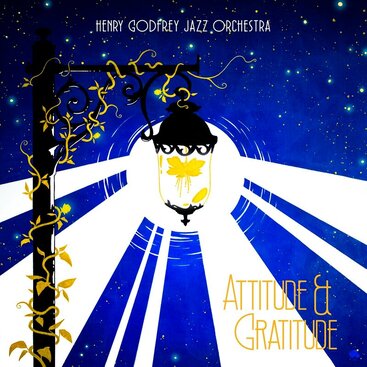
The compositions are great examples of the bone-crushing funk that we love so much. All that within the context of a rich Jazz heritage from which Godfrey draws heavily and relentlessly. Godfrey wrote each song on the album.
The core band is, of course, Godfrey on drums, Mike Keingstein, Matt Kelly, Eli Block, and Zoe Murphy on trumpets, Aaron Dutton, Alex Ramirez, Ian Buss, Anton Derevyanko, and Nicolas Suchecki on saxophones, Joey Dies, Jasmine Sloan, and Sam Margolis on trombones, and Michael Juba Prentky on bass trombone and tuba. Then there is Pritesh Walia on guitar, Rowan Barcham on piano, and Anna Abondolo on bass. These artists turn it in and turn us on.
The five incredible tracks on the album are of extended length and make plenty of room for the players to get their solos and to give us a fully developed sense of the pieces themselves. They swing, they groove, they make your hair stand on end.
The album opens with For McCoy and it pays great honor to the legendary McCoy Tyner, showing the influences of McCoy’s signature approaches. Pianist Rowan Barcham has the wondrous task of applying the Tyner touches and he nails it beautifully. The guitarist Pritesh Walia gives us an extraordinary solo that is worth replaying over and over. Listen for Anna Abondolo’s understated bass and the thunderous touches she offers. An excellent start to an excellent album.
Mad Max is the recollection of Washington DC’s go-go music. DC is where Godfrey honed his gigging chops and he brings it all to bear here. Nicholas Suchecki gives some cool sax soloing.That baritone sax is a wonder. Eli Block’s trumpet solo is a fun one, too. The 12:54 length of the track gives room for extended soloing. Then comes Godfrey. His solo is a fascinating turn that is set up throughout the song.
Forgetting What Will Never Be is a life lesson to anyone who has loved deeply and lost it. The palpable melancholy is enhanced by Joey Dies’ warm but sad trombone solo, weaving in and out of the brilliant horns. It is an ever-progressing story and Anna Abondolo’s bass solo adds depth to the tale. The percussion sets up the bolero-mambo feel to the song, actually making the song sadder, especially with Dies’ trombone closing. Wonderful.
Hot Water is a tip of the hat to Godfrey’s days as a chef at a Boston udon restaurant. Hot Water was the nickname given him there. That hot water sensation is displayed with the hard-swinging approach to this tune that imagines hot water coming to boil. Jasmine Sloane’s excellent trombone solo is terrific. Then Anton Derevyanko adds his tenor sax for his own amazing solo. The lower horns carry on a motif that sticks with you. This is a brilliantly written work and it is played exceptionally.
The album closes with We’ll Get There. The drums and alto saxophone pair up to open the song. This is a magnificent introduction. The song is inspired by the determination for our communities to get through the pandemic but it also resonates individually. A longer piece, it also creates space for free expression from the horns’ chant. Matt Kelly’s trumpet is featured in a virtuosic solo. But wait for Godfrey’s solo on the drums before the brilliant fade-out of the song.
Henry Godfrey Jazz Orchestra’s Attitude & Gratitude is full of both. The aggression, the sensitivity, the determination provide all the attitude you could hope for. The results for the listener is gratitude.
~Travis Rogers, Jr. is The Jazz Owl
 RSS Feed
RSS Feed
